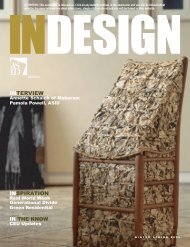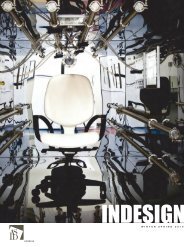Summer/Fall 2006 - ASID Georgia Chapter
Summer/Fall 2006 - ASID Georgia Chapter
Summer/Fall 2006 - ASID Georgia Chapter
You also want an ePaper? Increase the reach of your titles
YUMPU automatically turns print PDFs into web optimized ePapers that Google loves.
georgia’s new contractor licensing<br />
what does it mean for design professionals?<br />
article by Kevin M. Veler, Esq.<br />
Are you prepared to get another license to stay in<br />
business? Think <strong>Georgia</strong>’s new contractor licensing<br />
act does not impact designers? Ready for a shock?<br />
Registered Interior Designers, already licensed under <strong>Georgia</strong> law,<br />
may now also need to hold a contractor’s license to continue their<br />
current business! Got your attention now? So let’s discuss what<br />
<strong>Georgia</strong>’s new contractor licensing system is and why it may impact<br />
designers. Then we will examine our options for protecting our<br />
businesses via our current licensing status with the state.<br />
The <strong>Georgia</strong> licensing law went into effect on July 1, 2005.<br />
Any contractor performing “construction” after January 1, 2008 is<br />
required to have a contractor’s license unless the work falls under<br />
the very limited exceptions. So let’s understand what constitutes a<br />
contractor under the act.<br />
Who is a Contractor?<br />
Work performed by designers often involves the improvement<br />
of real property and, at a minimum, construction management services.<br />
Designers often have contractual risks to the owner for the<br />
construction. Those services typically would fall under the broad<br />
definition of contractor (please see the <strong>ASID</strong> GA website for full<br />
definitions of contractors). It takes a very limited business model<br />
to avoid qualifying as a “contractor” under the new law. Designers<br />
will need to limit their business models (which could create excessive<br />
economic hardship in the marketplace), find an exemption<br />
from the coverage of the act or apply for a license. And there is an<br />
extremely important deadline looming at the end of this year! **<br />
There are a few exemptions from the act. Please see the inset<br />
below to see why Registered Interior Designers are not exempted<br />
from the <strong>Georgia</strong> construction licensing act and visit www.asidga.<br />
Why Registered Interior Designers<br />
are not exempted from the <strong>Georgia</strong><br />
construction licensing act<br />
Architects are exempt from licensing<br />
and many would think that because<br />
Registered Interior Designers are<br />
regulated by the <strong>Georgia</strong> State Board<br />
of Architects, Registered Interior<br />
Designers would be exempt as well. A<br />
technical reading of the law indicates<br />
that Registered Interior Designers are<br />
NOT “architects” licensed under <strong>Chapter</strong><br />
4 of Title 43; rather Registered<br />
Interior Designers are registered as<br />
“designers” under Article 2 of chapter<br />
4 of Title 43.<br />
What does this mean? No official ruling<br />
from the State Licensing Board for<br />
General and Residential Contractors<br />
on this specific issue is posted on the<br />
official board website; however, it does<br />
not appear that there is an exemption<br />
from the coverage of the construction<br />
licensing act for Registered Interior<br />
Designers. IF designers are NOT<br />
EXEMPT and to the extent they are<br />
covered by sections of the Act regarding<br />
construction, they are required to<br />
be licensed.<br />
org for more details.<br />
So how does this pertain to me?<br />
Some feel the term “Specialty<br />
Contractor,” and the related exception<br />
from the coverage of the act,<br />
will allow them to avoid obtaining<br />
a contractor license. A designer<br />
with this limited business model<br />
may fall within the specific exception<br />
provided they can overcome a<br />
big obstacle. The work that a specialty<br />
contractor may offer must be<br />
done ONLY by “direct employees.”<br />
A specialty contractor may perform<br />
limited, specialty, or specific trade<br />
contractor work, which does not<br />
entail the delegation or assignment<br />
to or engagement of any other<br />
person or entity other than direct<br />
employees. If you limit your business<br />
model, in a changing environment,<br />
you may not be able to take<br />
on desired work and ultimately you may find that you will have to<br />
obtain a license anyway.<br />
Licenses available<br />
There are three types of licenses available: Residential – Basic<br />
License; Residential – Light Commercial License; and General<br />
Contractor License. The work that may be performed is determined<br />
by the type of license. Please see www.asidga.org for definitions on<br />
the three different types of contractors and visualize the work you<br />
anticipate performing. If you are going to obtain a license, the type<br />
of license you obtain will be critical.<br />
How to apply<br />
Those who want a license will have to either have file an application<br />
and take the appropriate test prior to the January, 2008<br />
date OR they will have to file an application and obtain an exemption<br />
from examination based upon their experience or reciprocity<br />
(whether interstate or intrastate). Interstate reciprocity will be<br />
determined after January 1, 2007. **Examination exemption applications<br />
will only be accepted by the Construction Licensing<br />
Board between January 1, <strong>2006</strong> and December 31, <strong>2006</strong>. In<br />
addition there is a currently a $200 application fee.<br />
Conclusion<br />
This article is based the licensing statutes currently existing on<br />
June 1, <strong>2006</strong>. It is anticipated that there will be a number of revisions<br />
in the 2007 legislative session. Review the inset box below<br />
on “What should you do?” and consider your options. Additional<br />
information and applications are available at the website for the<br />
State Licensing Board for Residential and General Contractors:<br />
www.sos.state.ga.us/plb/contractors. <strong>ASID</strong> will also be posting information<br />
on its website & publications. During this critical period,<br />
please keep up to date with the information posted. If you are not<br />
a registered interior designer, you<br />
should strongly consider becoming<br />
one in the event that an exemption<br />
is created specifically for<br />
licensed interior designers under<br />
the contractor licensing act.<br />
What should you do?<br />
There will be revisions to the current<br />
act in the 2007 legislative session to<br />
correct a number of problems. It is<br />
very likely that there will be some effort<br />
by a number of professional associations<br />
to create additional exemptions<br />
similar to those granted to professions<br />
such as architects and engineers. It<br />
is also likely the <strong>Georgia</strong> <strong>ASID</strong> will<br />
attempt to find a solution which<br />
some would propose should exempt<br />
registered interior designers who are<br />
licensed by the state under NCIDQ<br />
authority. However, in the world of<br />
politics, there is no assurance that an<br />
acceptable solution will be achieved.<br />
Unless legislative relief is obtained, the<br />
options for designers at this point are<br />
very limited. For those who can qualify<br />
Kevin has over 23 years experience in law<br />
and is also the legal advisor to the National<br />
Association of the Remodeling Industry<br />
– Atlanta chapter. Kevin may be reached at<br />
770.752.0990 or via email at kmv@kmvlaw.<br />
com. This article is for general purposes only<br />
and does not constitute specific legal advice.<br />
Copyright © <strong>2006</strong> Kevin M. Veler<br />
For the full article, please visit www.asidga.org<br />
for an exemption from examination,<br />
it is clearly advisable to complete<br />
application and obtain a license. To<br />
do so, you need to file all documents<br />
prior to December 31, <strong>2006</strong>. You may<br />
find the application and other important<br />
information at www.sos.state.<br />
ga.us/plb/contractors. For those who<br />
cannot qualify for the exemption, if the<br />
political response fails, you may want<br />
to consider making application after<br />
January 1, 2007 for taking the exam<br />
and obtaining a license.<br />
At a minimum, you need to consider<br />
having your contract reviewed by legal<br />
counsel to assure that your contract<br />
will be in compliance with the new law<br />
and that you will not perform work for<br />
which you are not licensed.<br />
features<br />
summer & fall <strong>2006</strong> |<br />
17







